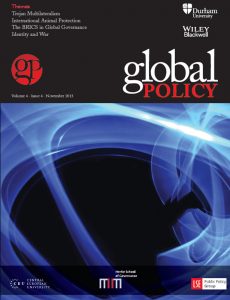Can green norms cross borders? The experience of Chinese students in the UK.
Much academic literature has been written about behaviour change. The traditional, ‘common-sense’ view is that attitudes precede behaviours, as stated in Azjen’s Theory of Planned Behaviour (TPB). This model has influenced policy-makers to seek to change citizens’ behaviour by simply providing information or providing feedback about the impacts of behaviour – on outcomes like our health, personal finances, the wellbeing of others, or the environment – and then hoping that enlightened citizens will do the rest. But this ‘ABC’ model...




1468-0491/asset/society_affiliation_image.gif?v=1&s=859caf337f44d9bf73120debe8a7ad67751a0209)
1756-2589/asset/NCFR_RGB_small_file.jpg?v=1&s=0570a4c814cd63cfaec3c1e57a93f3eed5886c15)